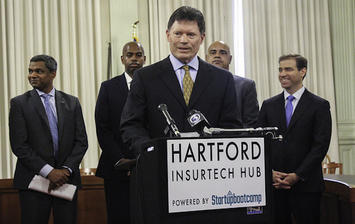
I recently recorded a podcast with my colleague Steve Eide in which he argued against the idea that attracting high talented people into government is what was needed for smaller, post-industrial cities.
I enjoy jousting with Steve on a variety of topics. He favors more aggressive state oversight of cities. As a rule I’m less sanguine about that. Because we come at the world from different perspectives, I’m often challenged by his provocative contrarian ideas.
To wit, he took his “against talent” thesis and wrote it up for the American Conservative. Some of this is standard conservative takes on things like public sector unions, but there are a number of ideas sure to get people arguing:
Any unbiased observer of our cities can see that mediocrity is the salient characteristic of the typical local American politician. Another important problem in small and mid-sized cities is that they are poor and in need of revitalization, especially in Rust Belt areas. A natural conclusion to draw from the coincidence of inept leadership and socioeconomic decay is that better leaders are needed. But in the poorest, most troubled cities, talented leadership is not much of an asset, and it can be a liability. Talent does real harm by raising false expectations of a revival—distracting from mundane yet essential operational matters, and forestalling state intervention at critical junctures.
….
When public-spirited reformers call for better leadership for cities, they typically have in mind a collection of qualities that are more likely to be possessed by an outsider. They are not sounding the call for everyone to get behind this or that city councilmember, someone who got his start as a campaign worker to some local hack and has patiently waited his turn. Instead, they want someone with experience and/or education that most of the local crowd does not have, derived perhaps from service in the private sector or government at the federal or state level. This is likely to be someone who did not come up through the ranks and can thus apply a novel approach to longstanding challenges; who admires innovation; who can envision a solution to every problem, instead of a problem with every solution.
….
But there’s no such thing as a right to revitalization. City reformers call for inspired leadership because they see it as a condition of revitalization, but what if that’s impossible? Our conception of urban renaissance is unduly influenced by the experience of a small handful of large cities. If you look past New York, San Francisco and Boston, and survey their dozens of small and mid-sized Rust Belt peers, it is very difficult to find an example of true revitalization. In a forthcoming research report, I survey 96 major poor cities in the Rust Belt and find that every single one has seen its poverty rate increase since 1970.
….
Perhaps the biggest problem with the talented-outsider mayor is that he is apt to get ideas. He may be more educated than the local doofuses, but that does not mean he is fully enlightened. It’s a case where a little knowledge can become a dangerous thing. State and local politicians who are known as big thinkers will always be strong candidates for a “public official of the year” award from Governing magazine or singled out as one of “America’s 11 Most Interesting Mayors” by Politico. New York and DC-based reporters from national publications are naturally attracted to mayors who can speak the language of urbanism.
But too much of urbanists’ advice for small and mid-sized cities consists of trying to impose lessons from successful top tier cities such as New York, Washington, San Francisco and Boston. Poor small and mid-sized cities should spend more time comparing themselves to other poor, small, and mid-sized cities. If you’ve lost half your population since 1950, you probably don’t have an affordable housing crisis; you’re not grappling with the challenges of density but rather a lack of density. If you have no wealth to redistribute in the first place, then Bill de Blasio can teach you little about the joys of redistribution.
….
“Flexibility,” like “innovation,” may be a core value in Silicon Valley, but it’s frequently a bad thing in the world of municipal finance. Remember all the encomiums to “boring banking” in the wake of the 2008 financial crisis? Often enough, the same principle applies for how to run a city.
Click through to read the whole thing.
This piece originally appeared on Urbanophile.
Aaron M. Renn is a senior fellow at the Manhattan Institute, a contributing editor of City Journal, and an economic development columnist for Governing magazine. He focuses on ways to help America’s cities thrive in an ever more complex, competitive, globalized, and diverse twenty-first century. During Renn’s 15-year career in management and technology consulting, he was a partner at Accenture and held several technology strategy roles and directed multimillion-dollar global technology implementations. He has contributed to The Guardian, Forbes.com, and numerous other publications. Renn holds a B.S. from Indiana University, where he coauthored an early social-networking platform in 1991.
Photo: CT Senate Democrats, CC BY-NC-ND 2.0












